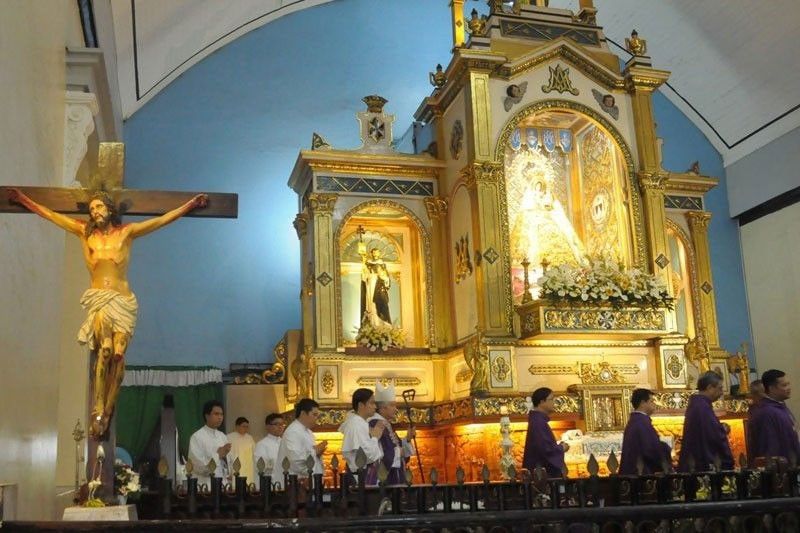Religious gatherings banned anew under GCQ

MANILA, Philippines — After several local officials expressed concern over the relaxation of restrictions on religious and other social functions, the Inter-Agency Task Force for the Management of Emerging Infectious Diseases (IATF) withdrew yesterday its earlier decision to allow the conduct of mass religious gatherings during the extended enhanced and general quarantine periods.
The reversal, presidential spokesman Harry Roque Jr. announced, came after officials complained that it would be impossible to implement physical distancing measures in religious and social meetings as well as work gatherings.
Until last night, the IATF remained in closed-door discussions relating to the extended enhanced community quarantine (ECQ) in Metro Manila and other provinces, as well as those under general community quarantine (GCQ).
“Following the complaints coming from local officials that it would be impossible to implement social distancing measures in religious and social meetings and work gatherings, we have changed the guidelines. The ban on work gatherings and religious activities remains even under the GCQ,” Roque said during the Laging Handa program yesterday.
He added that the IATF has consulted various religious groups in the country, which also agreed on the need to ensure the safety of the greater majority over physically going to traditional churches or worship places.
“They agreed that there should be no religious meetings under the GCQ,” Roque said, adding that while many want to go to church, there is a need to weigh the consequences of risking oneself in case people are allowed to attend religious services or activities.
There are now alternative means of practicing one’s faith, Roque said, which have shifted to online worshipping services or via TV and radio broadcasts.
Meanwhile, the Department of Transportation (DOTr) has required all public utility vehicles (PUVs) as well as transport terminals and operators to adhere to safety, capacity and coverage for its operations under the GCQ.
Public transportation in moderate and low-risk areas under GCQ were allowed to resume operations yesterday at a reduced capacity to ensure compliance with strict safety measures against COVID-19 transmission.
Under DOTr guidelines, capacity and passenger load factors are required for each mode of transportation to ensure that physical distancing is followed. Passenger load for public utility buses and modernised public utility jeepneys should not exceed 50 percent or half of the vehicle’s capacity, excluding driver and conductor.
For UV Express and taxis, passenger load should not exceed two passengers per row, except for the driver’s row where only one passenger is allowed.
Tricycles, on the other hand, must not exceed one passenger in the sidecar, while “backriding” will not be allowed.
The DOTr also required the mandatory use of face masks and gloves for drivers as well as thorough disinfecting of vehicles, terminals and even among passengers.
Personnel from the Land Transportation Franchising and Regulatory Board, Land Transportation Office, Inter-Agency Council on Traffic and the IATF would conduct daily random inspections in terminals and depots to ensure strict compliance with the service, sanitary and operational requirements of the guidelines.
Private cars and motorcycles will be allowed to operate for essential travel only as defined by the IATF. Cars will only be allowed one passenger to occupy the front passenger seat, while front-facing seats shall not exceed two passengers per row.
Motorcycles are prohibited from having passengers.
The use of bicycles and similar devices are also highly encouraged, and LGUs are encouraged to identify bike-lanes or bike-only roads.
“Public transportation in the road sector will be available in areas declared under GCQ but we will strictly impose health safety standards at all times to ensure the safety of our drivers and passengers,” DOTr Assistant Secretary Mark Richmund de Leon said.
Private vehicle owners, public utility vehicle (PUV) drivers and operators and transport terminal operators who violate the guidelines would be sanctioned and penalized.
Sen. Nancy Binay said the government should now deploy an “army of COVID-19 trackers” to prevent community reinfections or even a second wave of the pandemic as the country transitions from ECQ to GCQ.
The trackers, she added, would be the key to curbing spread of the virus in communities.
“As time goes by, the ranks of our health workers, as well as those who we rely on in barangays, are getting thinner. The first step once ECQ is lifted is to see to it that the LGU is ready and well-equipped when it comes to tracking possible carriers who have been exposed to infected people. It is best that we come prepared and start training an army of contact tracers as we transition from ECQ to GCQ,” Binay said in a statement.
Currently, the IATF has tasked the Department of the Interior and Local Government and the Philippine National Police to do contact tracing since policemen are trained in surveillance and information gathering.
- Latest
- Trending





























